 Now days parliament is discussing the various drafts of the law (bill/RUU). There are five bills related to the implementation of the decentralization policy. Namely, the local government bill, village bill, the election bill, bill of financial ties between regional and center (HKPD), and Bill of civilian state apparatus (ASN).
Now days parliament is discussing the various drafts of the law (bill/RUU). There are five bills related to the implementation of the decentralization policy. Namely, the local government bill, village bill, the election bill, bill of financial ties between regional and center (HKPD), and Bill of civilian state apparatus (ASN).
Ideally, those five bills run harmonious, compact, and synergistically so that each policy can be effective, especially in the implementation of regional autonomy, the spearhead of the government of Indonesia. If not, the effectiveness of government could be disrupted.
Of academic observations, each has a different paradigm. In local government, for long time Indonesia has adopted an integrated the prefectures system. The system was adopted throughout the period of the Dutch colonialism era then continued during the Japanese occupation. The system was not adopted during independence period. It’s only implementation period of the enactment of Law No. 1/1957 which is replaced by Law No. 18/1965. At that time, Indonesia has adopted and implemented direct election that sparked the tension relation between Bung Karno and Bung Hatta. Outside this period, Indonesia adopted a prefecture that recognizes the existing of government representatives.
Prefectural system was not accompanied by direct election. Election, either directly or indirectly, the system was only adopted by the Japanese during the 60’s, to ascertain whether the head of the region accepted by the public or not, other than that they have to meet other criteria in order to be elected as head of the regional (Kepala daerah)
From this point of view, there is a conflict between the local government bill and the election bill. Academically, the conflict is predicted to cause doubt and uncertainty in the level of government legislation and praxis. Countries which not adopt the prefectural system also not all adopt direct election as the sole criteria for determination of regional head (kepala daerah)
Related to the village, a local government is a formal building of state structure which is clearly accommodated organizationally. Village, in the concept of the founding fathers is informal autonomy (feet). Draft material of bill has systemized the village as state structure through the village Secretary. The clash between the local government bill and the village bill was not “sounds” in the village level paradigm, but bring the formal structure becoming more complicated, even overwhelmed. The clash happened is inconsistent with the view of the village what was contained in the two bills. The complexity also makes the realm of praxis problematic later.
Harmonization Needed
The next clash on paradigm issues is ASN Bill. In this world, human resource management and regional center always concern on the organ state of big box that taken separately because of decentralization. A box organ of state to consider is the organ of political authority holder. Human resources into two separate states, namely local and national.
As a result, there are three major paradigmatic system of human resource management area. Namely, first, separated system, full power of HR management (from A to Z ) is under autonomous region. Central government to make a code of conduct to be obeyed and overseeing.
In these systems, local officials are not allowed to be moved between regions and especially center employees. There is no central unit that manages the technical human resource management area. All human resources management matters regulated and managed by autonomous regions. Human Resource Management in the center of this system, therefore, has its own path. ASN bill seems does not adopt this system.
The second system is a unitary system (unified). In such systems, there is a central unit that is independent and autonomous regions established to manage the technical management of all employees of autonomous regions in the country concerned. Employees allowed moving between regions autonomous region, and not a center employee.
A to Z affairs managed by that unit. The central government re-made code of conduct and supervision. A center employee has separate management and has its own governing body. Apparently, ASN bill also does not adhere that system.
The third system is the integrated system. In this system, the central and sub-national civil servants governed and administered by an agency under the central government. Autonomous regions have very little authority in the area of personnel management.
Again, ASN bill seems not clearly embrace the system. Human resources box area and the center is not firm. It doesn’t consider who the top level in human resource management is. The extent to which the authority of the autonomous region is not clear. It can be said, ASN bill does not have any paradigm of the interest of the autonomous region. Really can confuse local autonomy.
Related to HKPD bill, which embrace a mix between a paradigm that should strengthen its own financial resources in the autonomous regions (financial balance) and the paradigm that relies on the ability of the management of public services regardless of where financial resources (financial relations).
If the government slammed the bill, it appears the problem is more technical in government instruments pathways. Therefore, all the instruments that made sense, could be expected to encourage harmonization and synergy between the two bills.
So the problem is the system affairs distribution is not clear in the government bill, while HKPD embrace “money follow function”. It can predicted the difficulties arise measuring a real regional budget needs to obey the second material of the bill later if implemented.
The biggest clash will happen in implementation of UU (Act) . The clash of the bill still can be discussed in the House of Representatives. The clash will happen in the implementation of act would make an ineffectiveness of government and lawlessness. The victim is a public. The clashes become systemic nature.
Seeing these clashes, harmonization measures should be conducted, It’s not about the article, but its done since the fifth paradigm of the bill. The Government and Parliament must sit together so that decision not create problem in the future. (Prof. Irfan Ridwan Maksum; Professor of Public Administration- Faculty of Social Sciences-UI, Member of the Regional Autonomy Advisory Council (DPOD) RI. JAWA POS, May 28, 2013)




